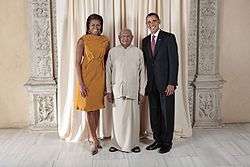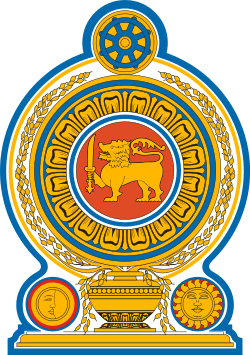Ratnasiri Wickremanayake (Sinhalese: රත්නසිරි වික්රමනායක,Tamil: ரத்னசிறி விக்கிரமநாயக்க; born 5 May 1933) was a Sri Lankan politician, who was the Prime Minister of Sri Lanka from 2000 to 2001 and again from 2005 to 2010. He was a National List member of the Parliament of Sri Lanka. His son Vidura Wickremanayake is also a member of the parliament.
Political career
Wickremanayake first served as Prime Minister from August 2000 to December 2001. He succeeded Sirimavo Bandaranaike after she resigned from the position at the age of 84. He is a senior vice-president of the ruling Sri Lanka Freedom Party (SLFP).
Wickremanayake was sworn in for a second time as Prime Minister of Sri Lanka by President Mahinda Rajapaksa on 21 November 2005. Speaking to journalists after being sworn in, Wickremanayake acknowledged the contribution made by the people to elect Rajapakse as the President. "But, they should not stop there. They should continue with their responsibility to push the Government and the President to do what country needs," he added.[1]
During Presidency of Chandrika Bandaranaike Kumaratunga, he held the Public Administration, Home Affairs and Plantation Industries portfolios. The decision to appoint Ratnasiri Wickremanayake as the Prime Minister appears to be taken at the last-minute, as his name did not figure in political circles until the night of 21 November 2005.
Wickremanayake was educated in Millewa Primary School, Dharmapala Vidyalaya, Pannipitiya, Hartley College, Point Pedro and Ananda College, Colombo and later as a student joined Lincoln's Inn to become a Barrister of Law, but ultimately chose to enter politics rather than appear for the exam.
During his time in UK he was elected president of the Ceylon Students' Association in the United Kingdom in 1955.[2] Wickremanayake returned to Sri Lanka following the demise of his elder brother Munidasa who was in active politics representing the Western Province parliamentary seat of Horana before he could sit for the final barrister's exam. On his return to Sri Lanka, he was elected to the legislature in 1960, from Horana for the Lanka Sama Samaja Party (then a part of the Mahajana Eksath Peramuna alliance). Wickremanayake joined the SLFP in 1962. In 1965, he was re-elected to the legislature for Horana from the SLFP.
Wickremanayake received his first ministerial appointment in 1970, when he was appointed Deputy Minister for Justice in the United Front government under Prime Minister Sirimavo Bandaranaike. In 1975, Wickremanayake was appointed Minister of Plantation Industries and the next year was also Minister of Justice. Like many other party stalwarts, Wickremanayake also lost his Parliamentary seat in the landslide defeat of the SLFP in 1977. He became General Secretary of the SLFP in 1978.
He rose to higher office in the government of President Chandrika Kumaratunga, becoming Minister of Public Administration, Home Affairs and Plantation Industries in 1994, and also being named the leader of the SLFP parliamentary party. He became Prime Minister in 2000 after the resignation of Sirimavo Bandaranaike, and briefly headed a minority SLFP government supported by the JVP for a year. His time as Prime Minister ended in October 2001 when the legislature after it became apparent that his government was about to lose a no-confidence motion.
After the SLFP won the 2004 parliamentary elections, Wickremanayake was appointed Minister of Buddhist Affairs, Public Security, and Law and Order, and Deputy Minister for Defence. He held both posts until being made Prime Minister in 2005.
Wickremanayake is seen by many as taking a harder stance on the Sri Lankan Civil War. During his previous term as Prime Minister, he refused to consider talks with the LTTE Terrorist group, and renounced terrorism. He has called for Sri Lanka's family planning policies to be modified, to encourage people to have more children . As an opposition politician, he also spoke against the present ceasefire arrangements at the time they were put in place.
Wickremanayake has since retired from politics.
See also
References
External links
|
|---|
|
|
|
| Western | |
|---|
|
| Central | |
|---|
|
| Southern | |
|---|
|
| Northern | |
|---|
|
| Eastern | |
|---|
|
| North Western | |
|---|
|
| North Central | |
|---|
|
| Uva | |
|---|
|
| Sabaragamuwa | |
|---|
|
| National List |
|
|---|


